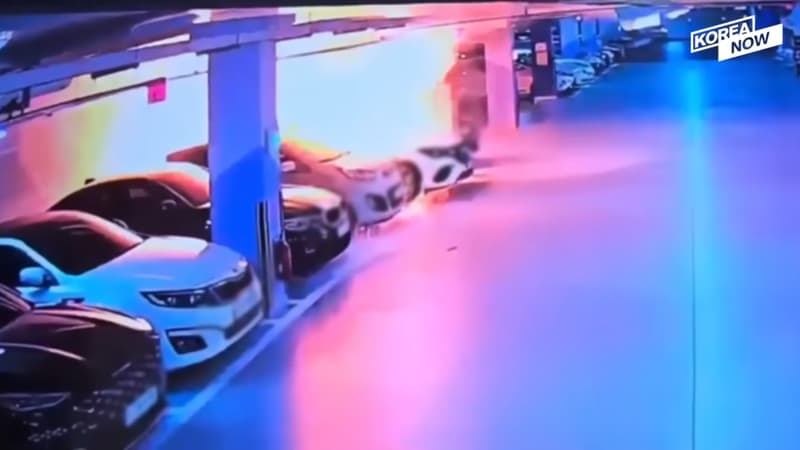South Korea is asking carmakers to provide more information about the batteries used in their electric vehicles, the government announced Tuesday, August 13. The request comes after a series of electric vehicle fires whose precise causes have not been established.
Two “mysterious” fires in just a few days
The most notable one occurred on August 1: a 100% electric Mercedes EQE caught fire for no apparent reason in the underground parking lot of a residential building in the city of Incheon, as can be seen in the images from surveillance cameras broadcast in a report by Korea Now.
An interesting detail: the vehicle was not plugged in, which a priori excludes a problem related to a recharging operation. The owner of the Mercedes also specified that it was parked in this place for three days (59 hours, to be exact).
The material cost is significant: around 140 cars in this car park were destroyed or damaged. The heavy smoke emissions resulting from this fire, which took the firefighters eight hours to control, also led to the evacuation of more than 200 families, with water and electricity cuts. In addition, 23 people poisoned by smoke were sent to hospital.
The investigation has yet to determine the exact cause of the fire, which is similar to the one that occurred a few days later, this time involving a model from local manufacturer Kia. An EV6 caught fire in a parking lot in the Geumsan district.
Featured electric vehicles
Although fires involving combustion vehicles are still more frequent than those involving electric vehicles, the latter are often impressive and difficult for firefighters to control. They are also widely shared on social media, often by “anti-electric cars”.
In South Korea, electric cars are already victims of this bad reputation after these recent fires:
“Several office buildings now ban entry and parking of electric vehicles, according to social media posts, while some apartment management committees advise EV owners to be careful when charging their cars,” notes a Japan Times article.
On online forums, Koreans attracted by Elon Musk’s models are also wondering whether they should cancel their order, with one driver claiming that a ferry company refused to transport his Tesla to Jeju Island. Another explains that his company has disabled the charging stations made available to employees.
In response to these fears, several car manufacturers had anticipated the Korean government’s request by publishing the list of their different suppliers by model, such as Hyundai, Kia and BMW.
Mercedes said the battery for the vehicle in question had been supplied by Chinese company Farasis Energy. The German manufacturer said it would continue to work with authorities to identify the cause of the fire and offer free inspections to owners of its electric models.
The CEO of Mercedes in South Korea was scheduled to meet with residents of the building affected by the fire on Wednesday.
A country “late” in electricity
With its domestic giants Hyundai and Kia offering numerous 100% electric models and battery manufacturers among the world’s leading manufacturers (Samsung SDI, LG Energy Solution and SK On), you might think that South Korea is one of the countries that has converted the most to electric cars. But the opposite is true.
This was highlighted in a Bloomberg article last April, highlighting the low market share of electric vehicles (6.2% of new car sales in 2023), compared to two other “high-tech” countries, the United States and Japan.
The magazine notes that this disenchantment with electric cars is partly explained by the strong presence of large residential buildings in the country, which reduces the possibilities of access to a charging solution.
The results of a Deloitte study cited in the article also echo this recent news on fires: 20% of respondents said safety was their main concern, the highest proportion in this global survey.
A level of fear that “reflects widespread concern about the risk of battery fires in these same residential buildings,” wrote Bloomberg, recalling that, in December 2023, South Korea had banned the installation of chargers below the second basement.
Source: BFM TV


